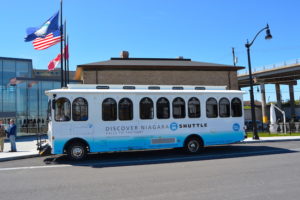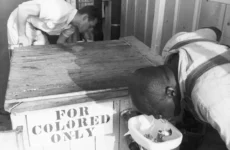By Joseph Kissel
When the recently built $43 million train station provided lucrative employment for mostly out-of-city workers, residents from surrounding neighborhoods quickly noticed nobody from their community was employed at the site.
“It’s a hard process and the biggest problem we have is to change the culture,” said outgoing Council president Charles Walker after the city council voted recently to enforce citywide its collective bargaining agreement regarding local and minority hires.
“We have to go up against people who have been saying ‘we’ve been doing it like this for 35 years,'” he said.
“We need to change the whole issue of poverty in the Falls,” said Mr. Walker, followed by loud applause in the council chambers.
While some are skeptical of the impact mandated hiring will have on job sites, nearly everyone agrees something has to be done about the crushing poverty in Niagara Falls that drives crime and violence, as well the ongoing epidemic here of babies born addicted to drugs and other disturbing sociological trends.
It often falls on the Niagara Falls Police Department to deal with the day-to-day consequences of this spiraling situation, and at the final budget amendment meeting last week, the council OKed returning two detective positions to the budget.
In suggesting a different approach to police management, though, Councilman Andrew Touma also invoked the phrase “changing the culture.”
He asked Police Superintendent Bryan DalPorto if it was feasible to return to a schedule of five days on and two days off instead of the current four and two that was adopted in 1985.
“It’s something the police department would have to accept,” Mr. DalPorto said, referring to the union’s contract.
Mr. Touma said he would not be surprised if most residents did not know police officers worked eight hour shifts.
Happier Times? Police Chief DalPorto (left) and Councilman Andrew Touma (right) appear to be on opposite sides on the budget battle over cuts to the police department.
Another resident suggested during the winter months — when he said anecdotally criminal activity seems to wane — as a money-saving effort, police could adopt an on-call system instead of a fixed amount of officers on the streets.
Having police living within the city would aid in this plan.
Although the resident didn’t say it, this would amount to more “changing the culture,” and one wonders how many times this phrase will be invoked as the city charts a new course and undertakes the corrective measures necessary for it not only to survive but thrive.
In other news… the Discover Niagara Shuttle will receive $70,000 in funding from the county approved unanimously by the legislature. The body is working on a permanent solution for funding with the state and the county, according to Legislator Jay Zona. NYPA also contributes $300,000, and he said if the shuttle starts charging a fee the authority would pull the money. He said no explanation was given as to why that would happen.
Despite the fact that the “free” Discover Niagara shuttles drive around the county practically devoid of passengers, like ghost ships with no purpose other than costing taxpayers and ratepayers $1 million a year, the politicians are falling over each other to continue funding the expensive, and failing, experiment.
Subscribe
Login
Please login to comment
0 Comments





















